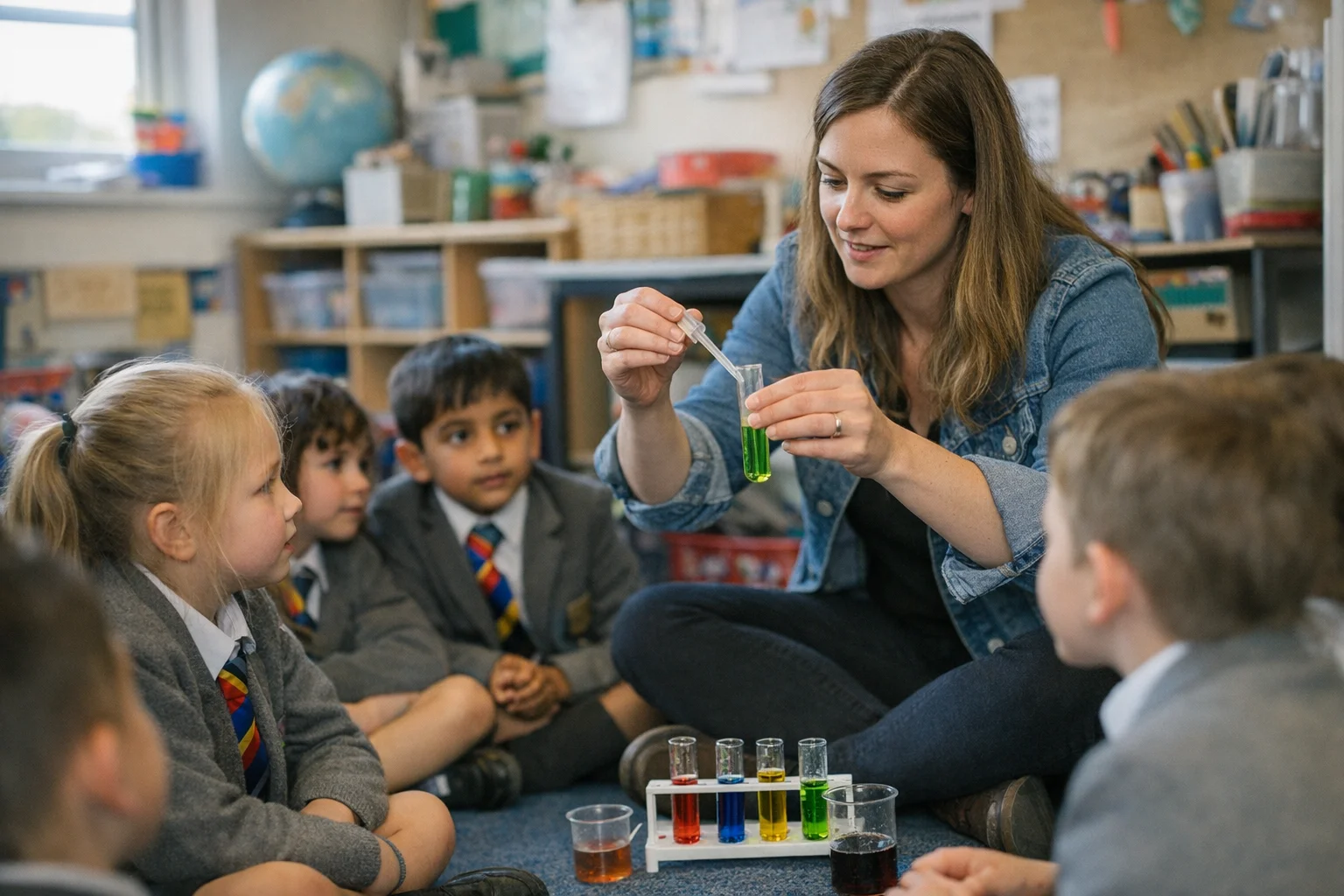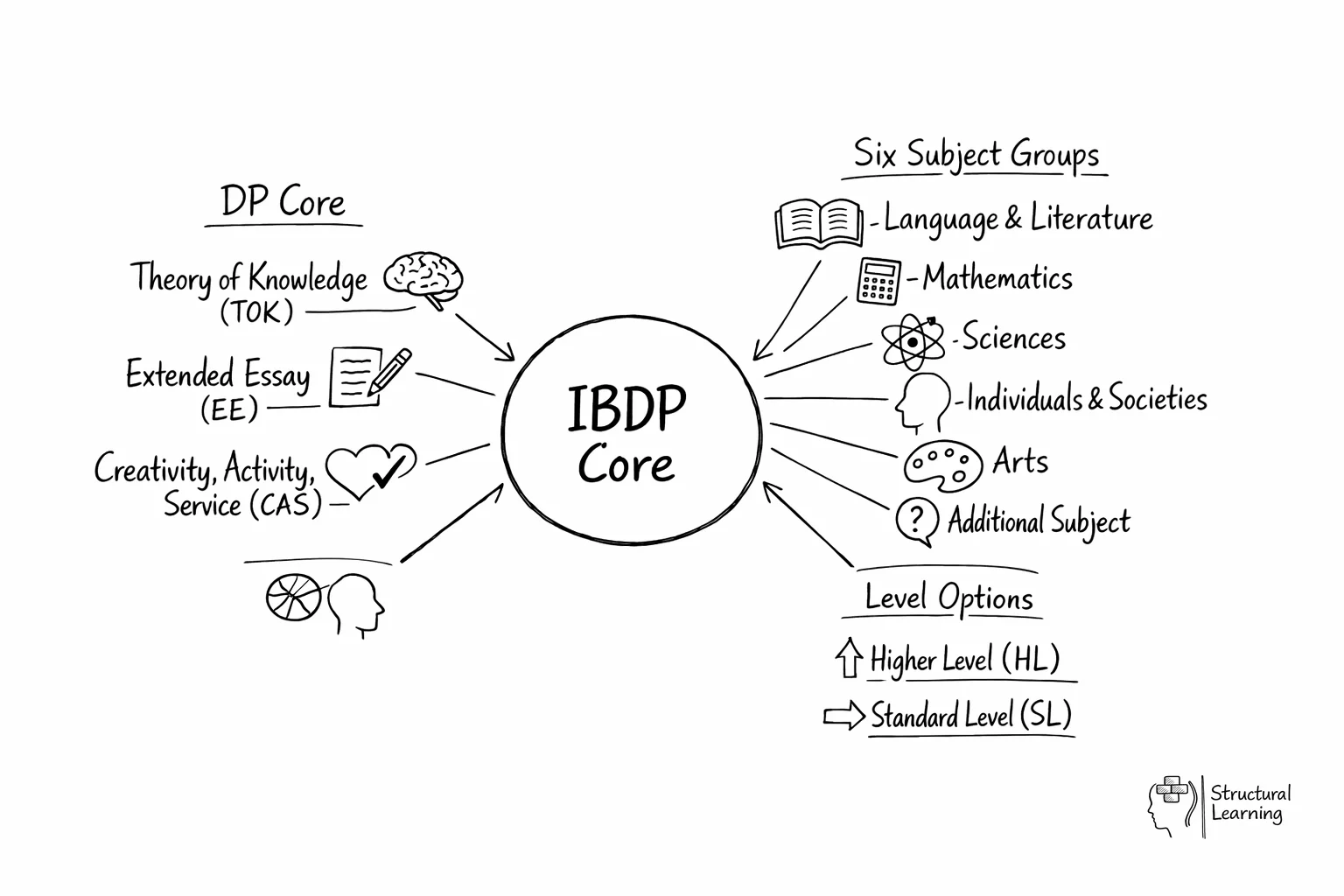IBDP syllabus: A teacher's guide
Explore the IBDP syllabus with insights on its structure, core components, subject groups, assessment methods, and effective teaching strategies for educators.


Explore the IBDP syllabus with insights on its structure, core components, subject groups, assessment methods, and effective teaching strategies for educators.
The IBDP syllabus is a two-year educational program for students aged 16-19 that includes core subjects (English Language Arts, Mathematics, Science, Social Studies) plus two elective subjects. Students can study up to four subjects at Higher Level (HL) for greater depth, while remaining subjects are taken at Standard Level (SL). The program emphasises both academic achievement and complete development through art, athletics, and communication skills.

The International Baccalaureate Diploma Programme (IBDP) is a comprehensive two-year educational program aimed at students aged 16 to 19, available in over 100 countries worldwide. Recognized for its rigorous academic standards and global acceptance, the IBDP prepares students for entry into higher education institutions around the globe, offering a diploma that many universities internationally hold in high regard.
Central to the IBDP's ethos is the delivery of a balanced education that emphasises not only academic achievement but also the complete development of students. This includes developing a range of skills beyond traditional academic subjects, such as art, athletics, personal growth, and communication abilities. Students engage with a variety of subjects, with the option to study up to four at a higher level (HL), providing a depth of knowledgein chosen areas. The program distinguishes between higher and standard level (SL) courses, with HL courses presenting a more in-depth and challenging curriculum.
The IBDP's core curriculum encompasses English Language Arts, Mathematics, Science, and Social Studies, alongside two elective subjects from an extensive selection, reflecting the program's commitment to offering a diverse and comprehensive education. This structure supports the development of critical thinking, effective communication, and an appreciation for cultural diversity, equipping students with the necessary tools for success in a rapidly globalizing world.
Available in both fully accredited IB World Schools and Associate Schools with partial access to the curriculum, the IBDP maintains a consistent syllabus across all institutions, although specific requirements may vary by school type. Regardless of the setting, the program's international education philosophy aims to cultivate knowledgeable, inquisitive, and compassionate young adults ready to make their mark on the world.
Key takeaways include:
The IBDP core curriculum consists of English Language Arts, Mathematics, Science, and Social Studies, plus two elective subjects chosen from an extensive selection. Beyond subject areas, the program includes three essential components: Theory of Knowledge (TOK), Extended Essay (EE), and Creativity, Activity, Service (CAS). These core elements develop critical thinking, research skills, and personal growth alongside academic studies.
The IBDP syllabus includes six subject groups and Diploma Programme (DP)core.
The Diploma Programme (DP) core is consisting of3 components, aimed at widening students' academic experience and challenge them to use their skills and knowledge.
Following are the 3 Diploma Programme (DP) core elements:
The six subject groups in IBDP Curriculum Model are as follows.

Language and Literature in the IBDP focuses on developing students' understanding of language through the study of literary and non-literary texts from various cultures and time periods. Students analyse how language shapes meaning, identity, and culture while developing their own critical reading and writing skills. The course can be taken at both Higher Level and Standard Level, with HL requiring more texts and deeper analysis.
To fulfil the core requirements of the IB programme, students must choose a single subject from studies in language and literature. Students may choose to obtain a bilingual diploma by choosing two different languages.
The courses include a wide range of texts, and students learn to use a language with great complexity and subtleties in various contexts across their education. This approach develops essential literacy skills and enhances students' thinking skill development. With the guidance of their school, students choose to study a language in which they are academically strong. Different types of school have differing ways of approaching this.
There are 3 courses on this diploma subject:
All of these courses, allow students to explore the significance of language as a means of understanding literature.
Beyond Language and Literature, the IBDP curriculum includes Individuals and Societies, Sciences, Mathematics, and the Arts. Individuals and Societies covers subjects like history and economics, while Sciences includes biology, chemistry, and physics. Mathematics offers various levels of study, and the Arts encompass visual arts, music, and theatre.
The six subject groups in the IBDP are designed to provide a broad and balanced education. These groups ensure that students are exposed to a variety of disciplines, developing intellectual curiosity and a well-rounded skill set. Here’s a brief overview of each:
The flexibility within these subject groups allows students to tailor their IBDP experience to their interests and strengths, ensuring a personalized and enriching educational journey. This complete approach not only prepares students for higher education but also equips them with the skills and knowledge to succeed in a rapidly changing world.
The IBDP syllabus provides a comprehensive and balanced education that prepares students for success in higher education and beyond. By combining rigorous academic study with personal development and global awareness, the IBDP aims to cultivate well-rounded, responsible, and engaged global citizens. For teachers, understanding the structure and components of the IBDP is essential for effectively guiding students through this challenging yet rewarding program.
Ultimately, the IBDP is more than just a curriculum; it's a philosophy of education that promotes lifelong learning, intercultural understanding, and critical thinking. By embracing these principles, teachers can helps their students to become active participants in shaping a better future.
For teachers seeking to deepen their understanding of the IBDP syllabus and its implementation, the following resources offer valuable insights and research:
The IBDP syllabus is a two-year educational program for students aged 16-19 that includes core subjects (English Language Arts, Mathematics, Science, Social Studies) plus two elective subjects. Students can study up to four subjects at Higher Level (HL) for greater depth, while remaining subjects are taken at Standard Level (SL). The program emphasises both academic achievement and complete development through art, athletics, and communication skills.

The International Baccalaureate Diploma Programme (IBDP) is a comprehensive two-year educational program aimed at students aged 16 to 19, available in over 100 countries worldwide. Recognized for its rigorous academic standards and global acceptance, the IBDP prepares students for entry into higher education institutions around the globe, offering a diploma that many universities internationally hold in high regard.
Central to the IBDP's ethos is the delivery of a balanced education that emphasises not only academic achievement but also the complete development of students. This includes developing a range of skills beyond traditional academic subjects, such as art, athletics, personal growth, and communication abilities. Students engage with a variety of subjects, with the option to study up to four at a higher level (HL), providing a depth of knowledgein chosen areas. The program distinguishes between higher and standard level (SL) courses, with HL courses presenting a more in-depth and challenging curriculum.
The IBDP's core curriculum encompasses English Language Arts, Mathematics, Science, and Social Studies, alongside two elective subjects from an extensive selection, reflecting the program's commitment to offering a diverse and comprehensive education. This structure supports the development of critical thinking, effective communication, and an appreciation for cultural diversity, equipping students with the necessary tools for success in a rapidly globalizing world.
Available in both fully accredited IB World Schools and Associate Schools with partial access to the curriculum, the IBDP maintains a consistent syllabus across all institutions, although specific requirements may vary by school type. Regardless of the setting, the program's international education philosophy aims to cultivate knowledgeable, inquisitive, and compassionate young adults ready to make their mark on the world.
Key takeaways include:
The IBDP core curriculum consists of English Language Arts, Mathematics, Science, and Social Studies, plus two elective subjects chosen from an extensive selection. Beyond subject areas, the program includes three essential components: Theory of Knowledge (TOK), Extended Essay (EE), and Creativity, Activity, Service (CAS). These core elements develop critical thinking, research skills, and personal growth alongside academic studies.
The IBDP syllabus includes six subject groups and Diploma Programme (DP)core.
The Diploma Programme (DP) core is consisting of3 components, aimed at widening students' academic experience and challenge them to use their skills and knowledge.
Following are the 3 Diploma Programme (DP) core elements:
The six subject groups in IBDP Curriculum Model are as follows.

Language and Literature in the IBDP focuses on developing students' understanding of language through the study of literary and non-literary texts from various cultures and time periods. Students analyse how language shapes meaning, identity, and culture while developing their own critical reading and writing skills. The course can be taken at both Higher Level and Standard Level, with HL requiring more texts and deeper analysis.
To fulfil the core requirements of the IB programme, students must choose a single subject from studies in language and literature. Students may choose to obtain a bilingual diploma by choosing two different languages.
The courses include a wide range of texts, and students learn to use a language with great complexity and subtleties in various contexts across their education. This approach develops essential literacy skills and enhances students' thinking skill development. With the guidance of their school, students choose to study a language in which they are academically strong. Different types of school have differing ways of approaching this.
There are 3 courses on this diploma subject:
All of these courses, allow students to explore the significance of language as a means of understanding literature.
Beyond Language and Literature, the IBDP curriculum includes Individuals and Societies, Sciences, Mathematics, and the Arts. Individuals and Societies covers subjects like history and economics, while Sciences includes biology, chemistry, and physics. Mathematics offers various levels of study, and the Arts encompass visual arts, music, and theatre.
The six subject groups in the IBDP are designed to provide a broad and balanced education. These groups ensure that students are exposed to a variety of disciplines, developing intellectual curiosity and a well-rounded skill set. Here’s a brief overview of each:
The flexibility within these subject groups allows students to tailor their IBDP experience to their interests and strengths, ensuring a personalized and enriching educational journey. This complete approach not only prepares students for higher education but also equips them with the skills and knowledge to succeed in a rapidly changing world.
The IBDP syllabus provides a comprehensive and balanced education that prepares students for success in higher education and beyond. By combining rigorous academic study with personal development and global awareness, the IBDP aims to cultivate well-rounded, responsible, and engaged global citizens. For teachers, understanding the structure and components of the IBDP is essential for effectively guiding students through this challenging yet rewarding program.
Ultimately, the IBDP is more than just a curriculum; it's a philosophy of education that promotes lifelong learning, intercultural understanding, and critical thinking. By embracing these principles, teachers can helps their students to become active participants in shaping a better future.
For teachers seeking to deepen their understanding of the IBDP syllabus and its implementation, the following resources offer valuable insights and research:
{"@context":"https://schema.org","@graph":[{"@type":"Article","@id":"https://www.structural-learning.com/post/ibdp-syllabus#article","headline":"IBDP syllabus: A teacher's guide","description":"What exactly is the International Baccalaureate Diploma Program and how best can teachers deliver it?","datePublished":"2022-07-26T15:46:50.107Z","dateModified":"2026-01-26T10:09:32.212Z","author":{"@type":"Person","name":"Paul Main","url":"https://www.structural-learning.com/team/paulmain","jobTitle":"Founder & Educational Consultant"},"publisher":{"@type":"Organization","name":"Structural Learning","url":"https://www.structural-learning.com","logo":{"@type":"ImageObject","url":"https://cdn.prod.website-files.com/5b69a01ba2e409e5d5e055c6/6040bf0426cb415ba2fc7882_newlogoblue.svg"}},"mainEntityOfPage":{"@type":"WebPage","@id":"https://www.structural-learning.com/post/ibdp-syllabus"},"image":"https://cdn.prod.website-files.com/5b69a01ba2e409501de055d1/6877858f318f70ad70b151c3_63a1df583370b9c5cae4078a_International%2520baccalaureate%2520diploma%2520program.jpeg","wordCount":2754},{"@type":"BreadcrumbList","@id":"https://www.structural-learning.com/post/ibdp-syllabus#breadcrumb","itemListElement":[{"@type":"ListItem","position":1,"name":"Home","item":"https://www.structural-learning.com/"},{"@type":"ListItem","position":2,"name":"Blog","item":"https://www.structural-learning.com/blog"},{"@type":"ListItem","position":3,"name":"IBDP syllabus: A teacher's guide","item":"https://www.structural-learning.com/post/ibdp-syllabus"}]}]}